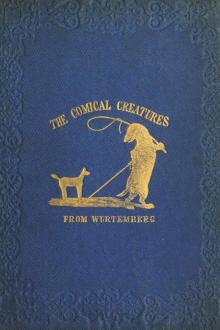The World of Ice, R. M. Ballantyne [e reader manga .TXT] 📗

- Author: R. M. Ballantyne
Book online «The World of Ice, R. M. Ballantyne [e reader manga .TXT] 📗». Author R. M. Ballantyne
The “Ay, ay, sir!” of the men was uttered with a heartiness that showed how powerfully this gleam of hope acted on their spirits; but a new damp was cast over them when, on gaining the open passage, they discovered that the bergs were not at rest, but were bearing down on the floe-ice with slow but awful momentum, and threatened to crush the ship between the two. Just then a low berg came driving up from the southward, dashing the spray over its sides, and with its fore-head ploughing up the smaller ice as if in scorn. A happy thought flashed across the captain’s mind. “Down the quarter boat,” he cried.
In an instant it struck the water, and four men were on the thwarts.
“Cast an ice-anchor on that berg.”
Peter Grim obeyed the order, and, with a swing that Hercules would have envied, planted it securely. In another moment the ship was following in the wake of this novel tug! It was a moment of great danger, for the bergs encroached on their narrow canal as they advanced, obliging them to brace the yards to clear the impending ice-walls, and they shaved the large berg so closely that the port-quarter boat would have been crushed if it had not been taken from the davits. Five minutes of such travelling brought them abreast of a grounded berg, to which they resolved to make fast; the order was given to cast off the rope; away went their white tug on his race to the far north, and the ship swung round in safety under the lee of the berg, where the crew acknowledged with gratitude their merciful deliverance from imminent danger.
Dumps was a remarkably grave and sly character, and Poker was a wag—an incorrigible wag—in every sense of the term. Moreover, although they had an occasional fight, Dumps and Poker were excellent friends, and great favourites with the crew.
We have not yet introduced these individuals to our reader; but as they will act a conspicuous part in the history of the Dolphin’s adventurous career in the Arctic regions, we think it right now to present them.
While at Uppernavik, Captain Guy had purchased a team of six good, tough Esquimaux dogs, being desirous of taking them to England, and there presenting them to several of his friends who were anxious to possess specimens of those animals. Two of these dogs stood out conspicuous from their fellows, not only in regard to personal appearance, but also in reference to peculiarities of character. One was pure white, with a lively expression of countenance, a large shaggy body, two erect, sharp-pointed ears, and a short projection that once had been a tail. Owing to some cause unknown, however, his tail had been cut or bitten off, and nothing save the stump remained. But this stump did as much duty as if it had been fifty tails in one. It was never at rest for a moment, and its owner evidently believed that wagging it was the true and only way to touch the heart of man; therefore the dog wagged it, so to speak, doggedly. In consequence of this animal’s thieving propensities, which led him to be constantly poking into every hole and corner of the ship in search of something to steal, he was named Poker. Poker had three jet-black spots in his white visage—one was the point of his nose, the other two were his eyes.
Poker’s bosom friend, Dumps, was so named because he had the sulkiest expression of countenance that ever fell to the lot of a dog. Hopelessly incurable melancholy seemed to have taken possession of his mind, for he never by any chance smiled—and dogs do smile, you know, just as evidently as human beings do, although not exactly with their mouths. Dumps never romped either, being old, but he sat and allowed his friend Poker to romp round him with a sort of sulky satisfaction, as if he experienced the greatest enjoyment his nature was capable of in witnessing the antics of his youthful companion—for Poker was young. The prevailing colour of Dumps’s shaggy hide was a dirty brown, with black spots, two of which had fixed themselves rather awkwardly round his eyes, like a pair of spectacles. Dumps, also, was a thief, and, indeed, so were all his brethren. Dumps and Poker were both of them larger and stronger, and in every way better, than their comrades; and they afterwards were the sturdy, steady, unflinching leaders of the team during many a toilsome journey over the frozen sea.
One magnificent afternoon, a few days after the escape of the Dolphin just related, Dumps and Poker lay side by side in the lee-scuppers, calmly sleeping off the effects of a surfeit produced by the eating of a large piece of pork, for which the cook had searched in vain for three-quarters of an hour, and of which he at last found the bare bone sticking in the hole of the larboard pump.
“Bad luck to them dogs!” exclaimed David Mizzle, stroking his chin as he surveyed the bone. “If I could only find out, now, which of ye it was, I’d have ye slaughtered right off, and cooked for the mess, I would.”
“It was Dumps as did it, I’ll bet you a month’s pay,” said Peter Grim, as he sat on the end of the windlass refilling his pipe, which he had just smoked out.
“Not a bit of it,” remarked Amos Parr, who was squatted on the deck busily engaged in constructing a rope mat, while several of the men sat round him engaged in mending sails, or stitching canvas slippers, etcetera. “Not a bit of it, Grim; Dumps is too honest by half to do sich a thing. ’Twas Poker as did it, I can see by the roll of his eye below the skin. The blackguard’s only shammin’ sleep.”
On hearing his name mentioned, Poker gently opened his right eye, but did not move. Dumps, on the contrary, lay as if he heard not the base aspersion on his character.
“What’ll ye bet it was Dumps as did it?” cried Davie Summers, who passed at the moment with a dish of some sort of edible towards the galley or cooking-house on deck.
“I’ll bet you over the ’ead, I will, if you don’t mind your business,” said Mivins.
“You’d better not,” retorted Davie with a grin. “It’s as much as your situation’s worth to lay a finger on me.”
“That’s it, youngster, give it ’im,” cried several of the men, while the boy confronted his superior, taking good care, however, to keep the fore-mast between them.
“What do you mean, you young rascal?” cried Mivins with a frown.
“Mean!” said Davie, “why, I mean that if you touch me I’ll resign office; and if I do that, you’ll have to go out, for everyone knows you can’t get on without me.”
“I say, Mivins,” cried Tom Green, the carpenter’s mate, “if you were asked to say: ‘Hold on hard to this handspike here, my hearties,’ how would ye go about it?”
“He’d ’it you a pretty ’ard crack hover the ’ead with it, ’e would,” remarked one of the men, throwing a ball of yarn at Davie, who stood listening to the conversation with a broad grin.
In stepping back to avoid the blow the lad trod on Dumps’s paw, and instantly there came from the throat of that excellent dog a roar of anguish that caused Poker to leap, as the cook expressed it, nearly out of his own skin. Dogs are by nature extremely sympathetic and remarkably inquisitive; and no sooner was Dumps’s yell heard than it was vigorously responded to by every dog in the ship, as the whole pack rushed each from his respective sleeping-place, and looked round in amazement.
“Hallo! what’s wrong there for’ard?” enquired Saunders, who had been pacing the quarter-deck with slow giant strides, arguing mentally with himself in default of a better adversary.
“Only trod on Dumps’s paw, sir,” said Mivins as he hurried aft; “the men are sky-larking.”
“Sky-larking, are you?” said Saunders, going forward; “weel, lads, you’ve had a lot o’ hard work of late, ye may go and take a run on the ice.”
Instantly the men, like boys set free from school, sprang up, tumbled over the side, and were scampering over the ice like madmen.
“Pitch over the ball!—the football!” they cried. In a second the ball was tossed over the ship’s side, and a vigorous game was begun.
For two days past the Dolphin had been sailing with difficulty through large fields of ice, sometimes driving against narrow necks and tongues that interrupted her passage from one lead, or canal, to another; at other times boring with difficulty through compact masses of sludge, or, occasionally, when unable to advance farther, making fast to a large berg or field. They were compelled to proceed north, however, in consequence of the pack having become fixed towards the south, and thus rendering retreat impossible in that direction until the ice should be again set in motion. Captain Guy, however, saw, by the steady advance of the larger bergs, that the current of the ocean in that place flowed southward, and trusted that in a short time the ice which had been forced into the strait by the gales, would be released, and open up a passage. Meanwhile he pushed along the coast, examining every bay and inlet in the hope of discovering some trace of the Pole Star or her crew.
On the day about which we are writing, the ship was beset by large fields, the snow-white surfaces of which extended north and south to the horizon, while on the east the cliffs rose in dark, frowning precipices from the midst of the glaciers that encumber them all the year round.
It was a lovely Arctic day. The sun shone with unclouded splendour, and the bright air, which trembled with that liquidity of appearance that one occasionally sees in very hot weather under peculiar circumstances, was vocal with the wild music of thousands of gulls, and auks, and other sea-birds, which clustered on the neighbouring cliffs, and flew overhead in clouds. All round, the pure surfaces of the ice-fields were broken by the shadows which the hummocks and bergs cast over them, and by the pools of clear water which shone like crystals in their hollows, while the beautiful beryl blue of the larger bergs gave a delicate colouring to the dazzling scene. Words cannot describe the intense glitter that characterised everything. Every point seemed a diamond; every edge sent forth a gleam of light, and many of the masses reflected the rich prismatic colours of the rainbow. It seemed as if the sun himself had been multiplied in order to add to the excessive brilliancy, for he was surrounded by parhelia, or sun-dogs as the men called them. This peculiarity in the sun’s appearance was very striking. The great orb of day was about ten degrees above the horizon, and a horizontal line of white passed completely through it extending to a considerable distance on either hand, while around it were two distinct halos, or circles of light. On the inner halo were situated the mock-suns, which were four in number—one above and one below the sun, and one on each side of him.
Not a breath of wind stirred the little flag that drooped from the mizzen-peak, and the clamorous ceaseless cries of sea-birds, added to the merry shouts and laughter of the men, as they followed the restless football, rendered the whole a scene of life, as it was emphatically one of beauty.
“Ain’t it glorious?” panted Davie Summers vehemently, as he stopped exhausted in a headlong race beside one of his comrades, while the ball was kicked hopelessly beyond his reach by a comparatively fresh member of the party.
“Ah! then, it bates the owld country intirely, it does,”





Comments (0)